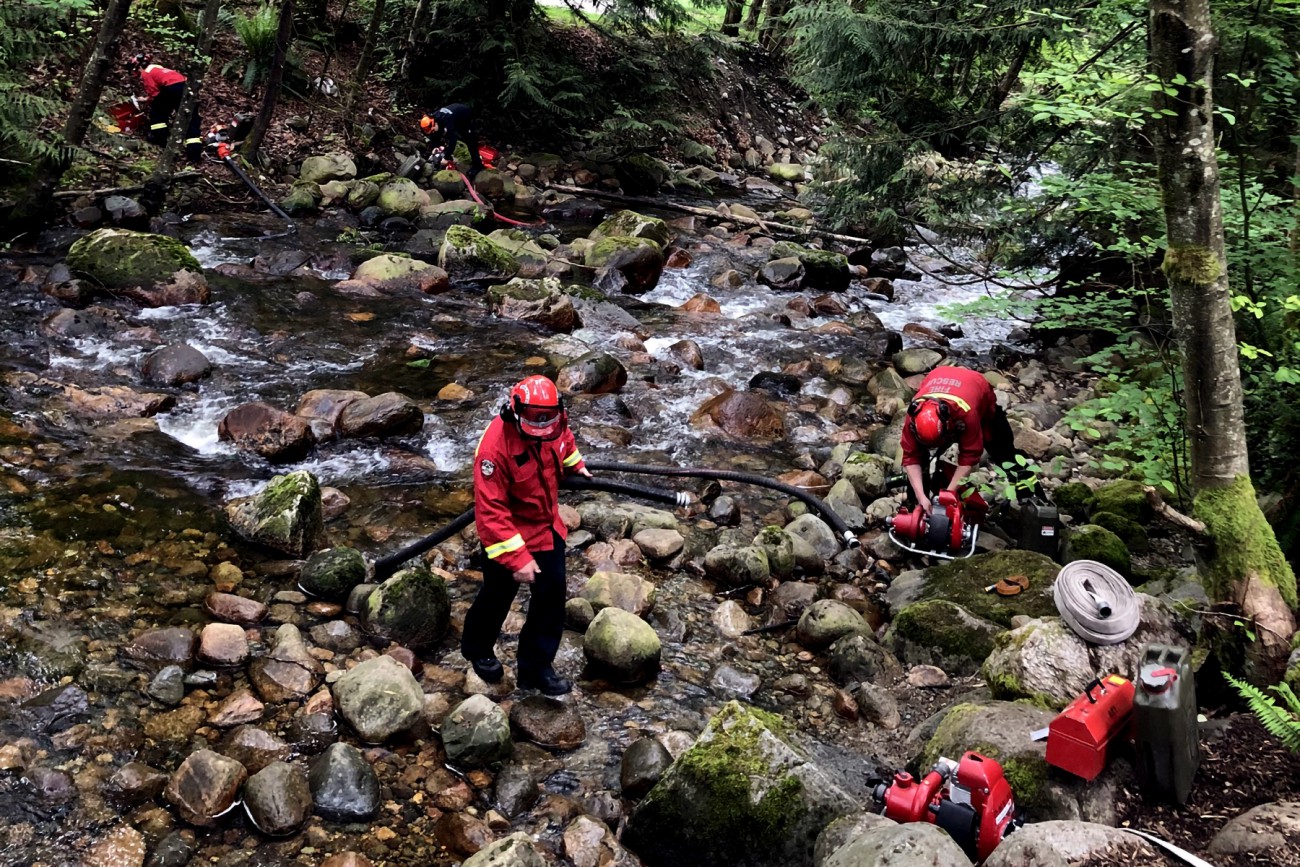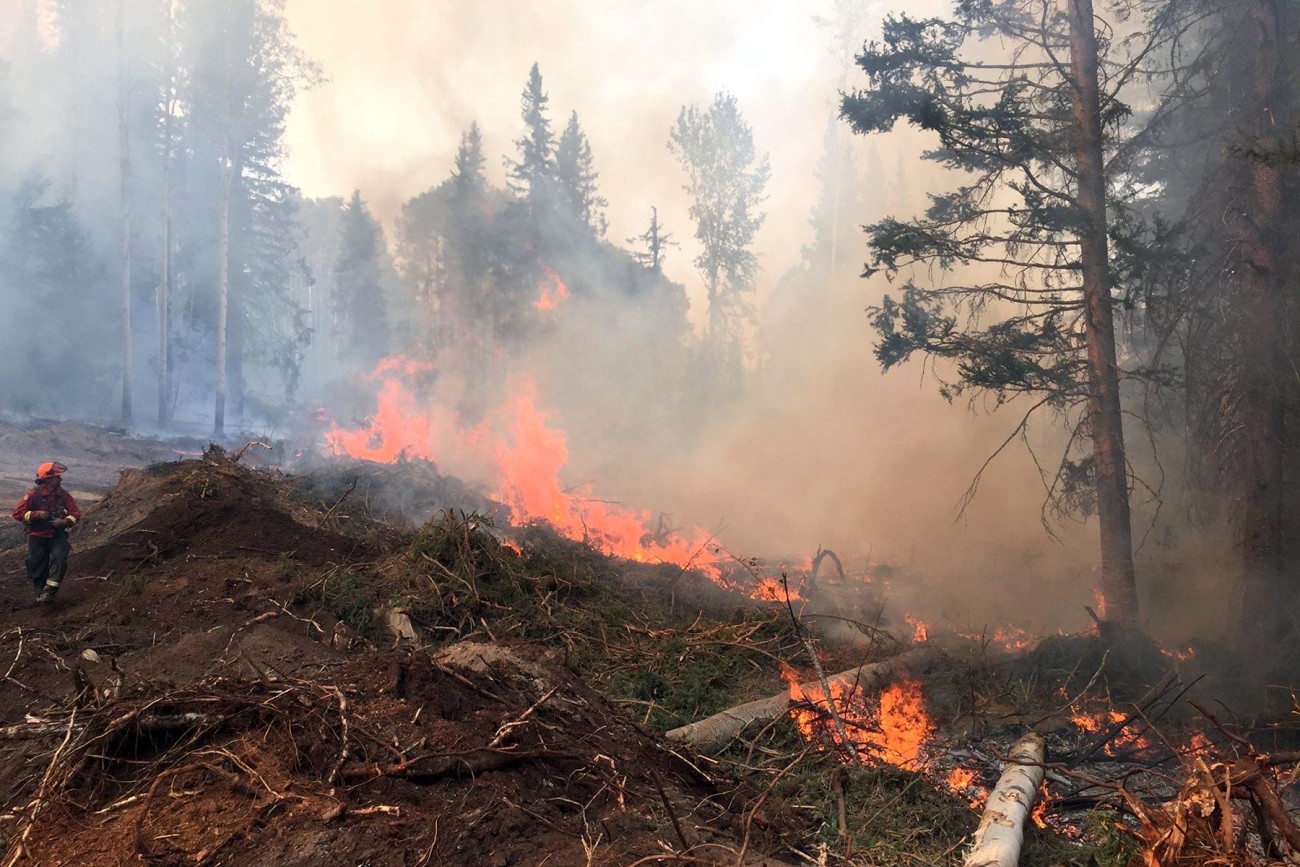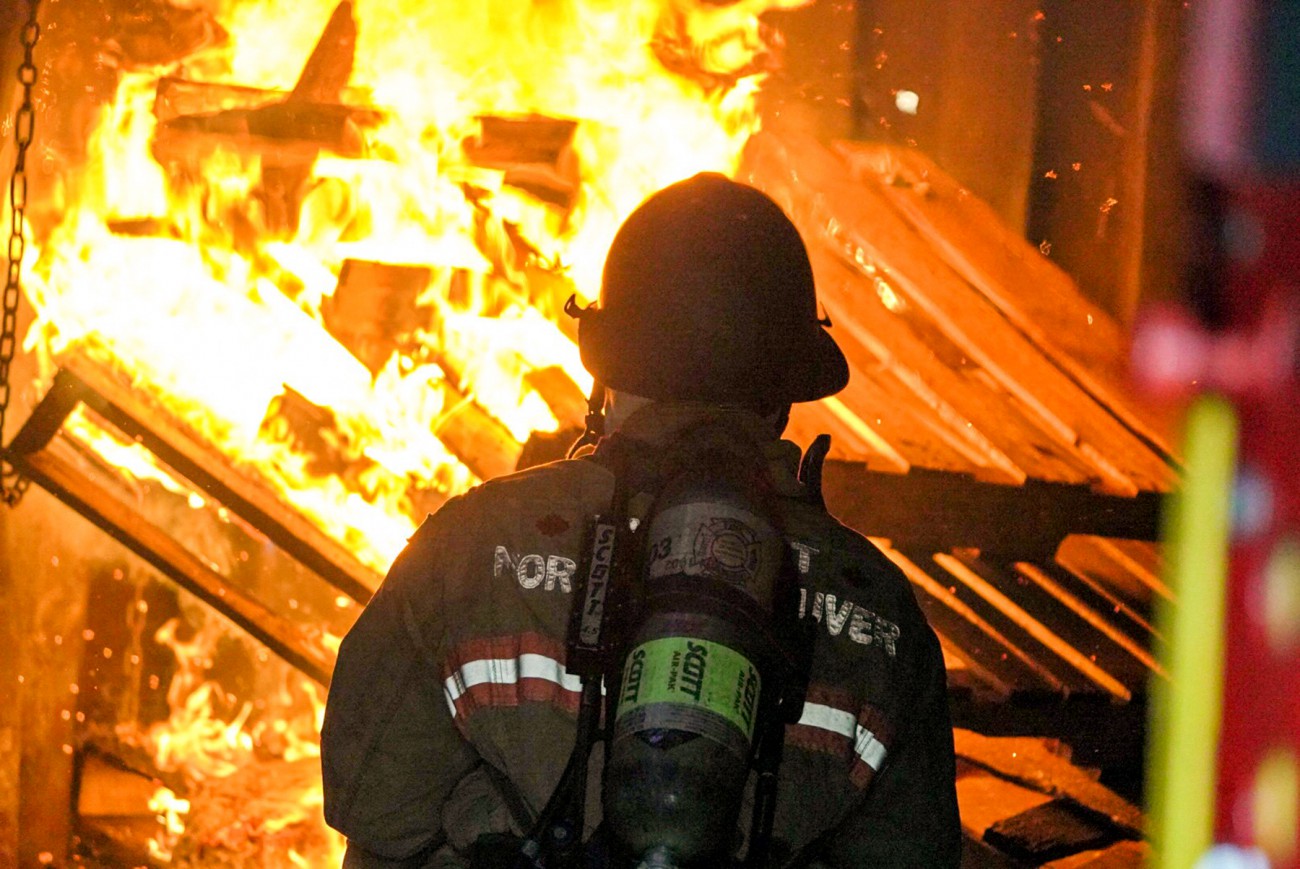Wildfire preparedness & response
Our firefighters take part in annual training opportunities and full-scale functional exercises to practice interagency response to a potential wildfire.
The District of North Vancouver has a significant amount of area where our community meets the forest, which may be especially vulnerable to wildfire damage. Our wildfire preparedness and readiness capabilities are enhanced through programs, partnerships, and training, as well as grant and funding opportunities.
In 2020, we continued our door-hanger program focused on the 7,000+ homes in our wildfire development permit area. We also designed and hosted a COVID-19 friendly wildfire tabletop exercise that had 12 agencies participate in-person.
Community Wildfire Protection Plan
Urban interface fires typically require more resources in terms of personnel and equipment than any one department has available and, by nature, they require cooperation and coordination between multiple departments, agencies, and organizations.
Our Community Wildfire Protection Plan (CWPP), which was updated in 2020, helps us prepare for, respond to, and recover from wildfires, particularly in areas where our community meets the forest, known as the ‘wildland urban interface.’
The plan contains 52 recommendations for improving our emergency response and training, community education, emergency communications, building practices, and more to make the District as fire-safe as possible.
Download the Wildfire Protection Plan

Wildfire Training and Deployments
To prepare for potential wildfires, our members undergo annual training and practice interagency communication during emergency response exercises.
Key training programs, exercises and deployments in 2020, included:
- Christie Mountain Fire near Penticton — deployed two DNVFRS members and a fire engine, along with one member who was assigned as a strike team/task force leader.
- Squamish Valley Fire — deployed five members and one of our Structure Protection Units (SPU’s).
- Sunshine Falls Fire — responded to a wildfire in the District’s Woodlands area, which was a great reminder of how quickly conditions can change and that we are well-prepared for a wildfire on the North Shore.
- Wildfire Initial Attack Crew (DNV-IAC) — this 25-member program, unique to a BC municipal fire department, has been established to fight wildfires within or adjacent to the wildland areas of the District. These fires may be inaccessible to our fire engines, so members have been selected and trained to fight wildfires in more remote locations and for extended periods.
- BC Wildfire Service strike team/task force leaders — training was completed by our command staff and wildfire instructor team leaders in a new provincial standard to support the BC Wildfire Service and Office of the Fire Commissioner. One of our newly trained task force leaders provided support during the Penticton wildfires this summer.
- Interagency wildfire tabletop exercise — we hosted this training event that included multiple agencies and stakeholders. This initiative was made possible by Community Resiliency Initiative (CRI) funding.
- ‘Chainsaw Safety & Cutting Techniques’ program — we expanded this program, liaising with Metro Vancouver Watershed Protection to enhance training for the DNV-IAC.
- 3rd Structure Protection Unit (SPU) — we completed the outfitting for this unit, which will be strategically positioned within the DNV for wildfire readiness and response.
- Wildfire Working Group — we developed this group, which includes partner agencies from across Metro Vancouver and the Sunshine Coast/Sea-to-Sky Corridor. This group will regularly discuss best practices regarding Wildfire PPE, equipment, training, and logistics.
Partnership with Metro Vancouver

Working with Metro Vancouver Watershed Protection on a variety of initiatives, we are able to enhance our inter-agency relationship and increase our interoperability in the event of a wildfire emergency or technical rescue.
We will continue to:
- Liaise with the Metro Vancouver Watershed Protection team on joint initiatives such as the Wildfire Initial Attack Crew (DNV-IAC) training, dangerous tree assessment, helicopter training and overall wildfire protection across the North Shore and in our two watersheds (Capilano and Seymour).
- Coordinate communications through weekly fire danger rating reports to update our new signage and social media channels throughout the hot and dry season.
FireSmart Community Program
The wildfire in Sunshine Falls has motivated many residents and communities to reach out and actively engage with DNVFRS.
Two of our communities are now officially recognized by FireSmart BC, with three more committing to community assessments by our Local FireSmart Representatives. FireSmart assessments include recommendations for mitigating measures to reduce risks to property by wildfire and increase the community’s resiliency. As of 2020, we have 11 members qualified through FireSmart Canada as Local FireSmart Representatives (LFRs).
During the dry season, we meet weekly with partners to discuss information about potential fire dangers and preparedness tactics. We also work with personnel on construction sites to mitigate risks when the fire danger rating reaches high or extreme.
Our Structure Protection Unit (SPU) was on display for a Community Demonstration Event in June hosted by our Wildland Instructors and LFRs in the Woodlands area, and we look forward to more events like this in the coming year.
As part of the FireSmart door hanger program, our firefighters, public safety personnel, chief officers, administrative staff, and District park rangers delivered outdoor burning information to 3,271 homes (an increase from 2,225 homes in 2019) in the urban interface and wildfire development permit area.
Members trained as Local FireSmart Representatives performed FireSmart reviews for five pocket communities in our urban interface, as well as six District-owned buildings identified as critical infrastructure.
We will continue to partner with the community and other agencies on the North Shore to increase FireSmart awareness and Community Risk Reduction.
Grant and Funding Opportunities
In 2020, we received a Community Resiliency Investment (CRI) grant through the Union of BC Municipalities.
The CRI grant program allowed us to move forward with pursuing a number of the recommendations Mayor and Council adopted as part of the Community Wildfire Protection Plan (CWPP).
We have worked with wildfire partner agencies such as Bowen Island, Coquitlam, Delta, Lions Bay, Port Moody, Richmond, Squamish, and the Sunshine Coast to better understand the wildfire capabilities of our neighbouring communities. We will be liaising with Britannia Beach and Whistler in 2021, and including all of these partner agencies in the working group, so that we can share information and provide better situational awareness during the wildfire season.

